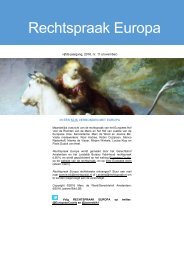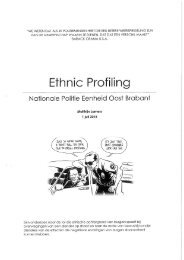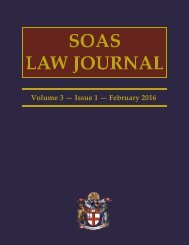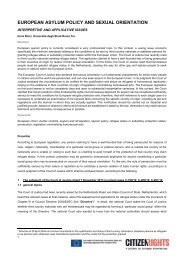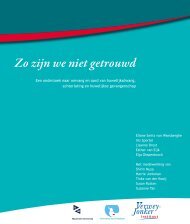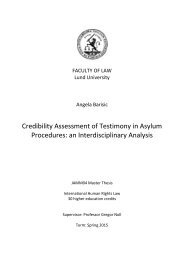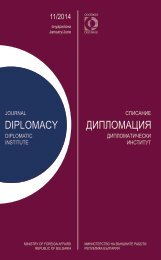AEMI
AEMI-2016-web
AEMI-2016-web
Create successful ePaper yourself
Turn your PDF publications into a flip-book with our unique Google optimized e-Paper software.
SARAH MARIJNEN AND JEROEN DOOMERNIK<br />
agencies have to mediate in a minimum<br />
number of adoptions in order to retain<br />
their business viability. The profit<br />
principle has become the most important<br />
concern for adoption agencies. Jan<br />
Wierenga, the former director of the<br />
Supervisory Board of Wereldkinderen,<br />
acknowledged in an interview 3 that due<br />
to the competitive character, adoption<br />
agencies cannot spend sufficient time on<br />
adoption cases. Therefore, they run the<br />
risk of conducting the adoption process<br />
less accurately and thus putting the interest<br />
of the adopting parents above the<br />
interest of the adoptive children. For example,<br />
as Wierenga explains, while the<br />
best interest of a child can be domestic<br />
adoption, driven by commercial interests<br />
adoption agencies may choose not<br />
to investigate this option.<br />
The commercial aspect is visible when<br />
we look at the costs for an adoption,<br />
which vary widely. According to Goodwin<br />
(2010), the adoption of a child<br />
costs between 20,000 – 50,000 USD.<br />
All the adoption agencies in the Netherlands<br />
are accredited under the Hague<br />
Convention and therefore required to<br />
inform adopting parents about the costs<br />
involved in ICA. An analysis of the websites<br />
of the six Dutch agencies that have<br />
a license from the Ministry of Security<br />
and Justice to mediate in ICA shows differences<br />
in fees. Different fees apply to<br />
different countries. For instance, adopting<br />
a child from China with the mediation<br />
of Wereldkinderen costs around<br />
20,000 euro (excluding travel costs and<br />
such), while the costs of adopting a child<br />
from Morocco, South-Africa and the<br />
Philippines are no more than 13,000<br />
euro. 4 Fees also vary between the adoption<br />
agencies for adoptions from the<br />
139<br />
same country. For example, Vereniging<br />
Wereldkinderen charges 14,713 euro<br />
for the adoption of an Ethiopian child,<br />
while Stichting Afrika charges 16,000<br />
euro. 5<br />
The price differentiation as presented<br />
above is another market feature in ICA.<br />
The Hague Convention stipulates that<br />
costs and fees should be reasonable and<br />
improper financial gains are prohibited.<br />
However, the adoption agencies that<br />
publish their costs and fees online do not<br />
specify these. Therefore, it is impossible<br />
to know where the money goes. Speaking<br />
with Vereniging Wereldkinderen,<br />
we learned that prospective parents have<br />
to donate to the orphanages a sum of<br />
money of up to 4,000 euro for the care<br />
of their child before the adoption. 6 It is<br />
up to the sending side to ask for a certain<br />
donation and it is in their power to ask<br />
for large amounts, as prospective parents<br />
are willing to pay because of their deeply<br />
rooted wish to have children. The donation<br />
is included in the agency’s fee,<br />
together with the cost of foreign salaries<br />
and operations and staff travel. This encourages<br />
corruption (Graff, 2008, 59).<br />
In the Dutch case, because of the high<br />
costs involved the Dutch Ministry of<br />
Social Affairs and Employment provides<br />
a subsidy of 3,700 euro per adopted<br />
child. 7 In this way the Dutch government<br />
is partly responsible for allowing<br />
and stimulating massive financial<br />
flows into the ICA system. According<br />
to Goodwin (2010), the donations<br />
by prospective adoptive parents to orphanages<br />
and government agencies in<br />
countries of origin create valuable contacts<br />
and therefore, it secures the supply<br />
of children for the adoption agencies.



